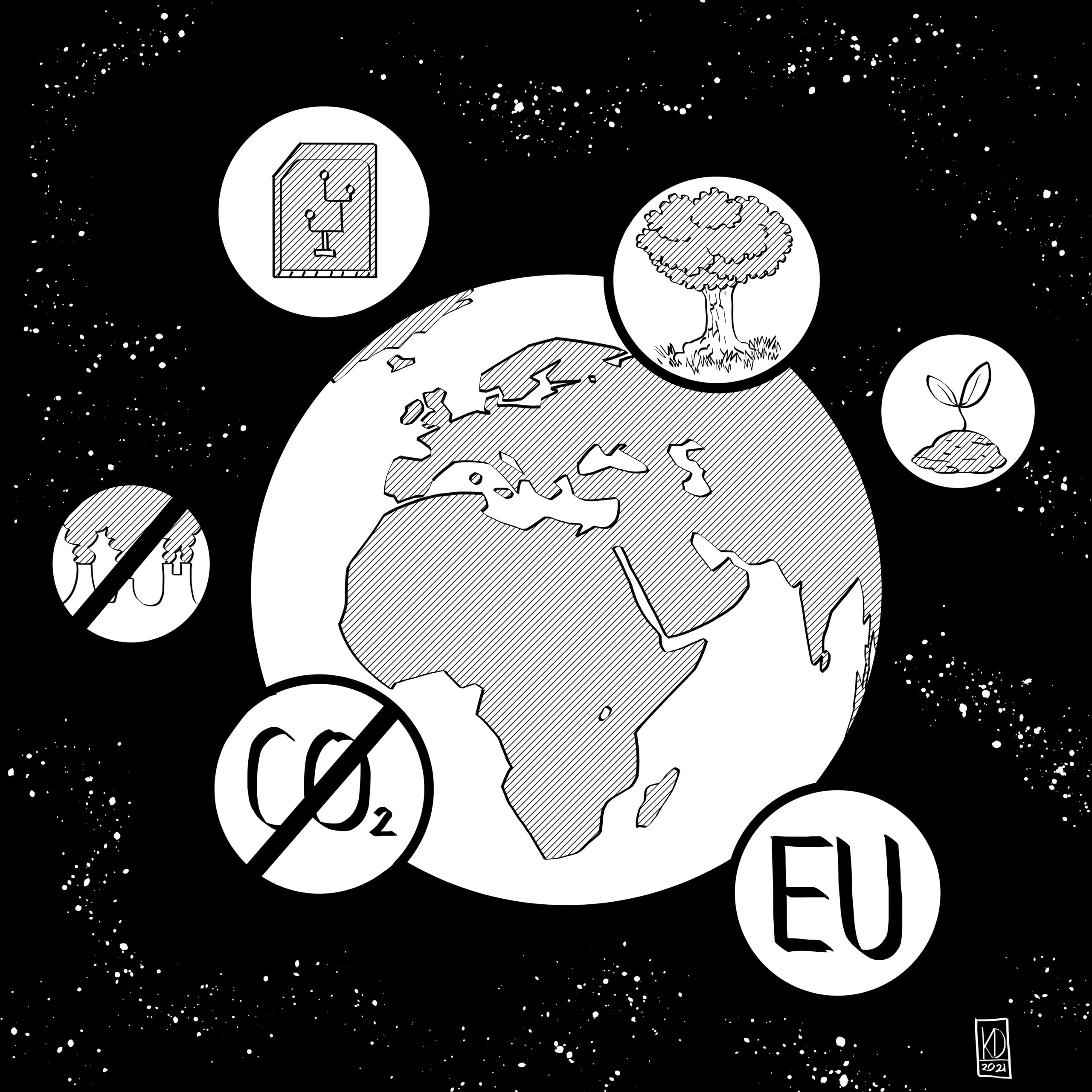The European Green Deal is a revolutionary vision of the social and economic development that the European Union wants to pursue in the coming decades. It appears that we are now in the final stages of formulating the foundations and objectives of a new industrial revolution, embarking on the journey towards an ‘environmentally friendly’ new future outlined in strategic documents prepared in Brussels. The scale of the aspirations, the scope of the anticipated changes, their impact on the lives of citizens and the level of the necessary investments, calculated in two-digit numbers, all make it difficult to assess what actually lies behind the implementation of the programs and strategies on the table, or the results they will bring and the extent to which the anticipated goals will actually be achieved.
“May you live in interesting times”.
We are witnessing a major political and economic offensive on the part of the European Union, which presumably intends to further integrate the member states, their economies and societies. This calls for changes and new regulations on many levels. Given its complexity and comprehensiveness, it often becomes difficult for citizens to understand, and thus can become a good background for numerous interpretations and manipulation of public opinion.
Here, we will regularly describe, interpret and logically evaluate the directions of changes implemented by the European Union, as well as decipher the content hidden behind official newspeak and often ideologically-charged terms used to describe the actions taken. At the beginning, in accordance with the terminology adopted by the European Union, we will describe the main assumptions and directions of development set by the European Green Deal and the New Industrial Strategy for Europe for industry and consumers.
New industrial revolution
Looking ahead to the next generation, by 2050, the fundamental goal of EU strategists is to change the image and shape of European industry. There will be a shift from linear production to a circular economy. At a general level, such a vision naturally deserves the full support of all European environments, however, it should be stressed that, as another proverb says, the devil is always in the detail. Meanwhile, the implementation of the project will probably mean a revolution, the effects of which we are not yet able to predict. Consumer habits will change, new businesses will be formed, new types of jobs will be created, requiring new skills and competences that we do not yet possess.
The primary objective set by the European Green Deal is “to transform the European Union into a just and prosperous society living in a modern, resource-efficient and competitive economy that achieves zero net greenhouse gas emissions in 2050 and where economic growth is separated from the use of natural resources”. It is the ambition of European leaders that the next three decades, i.e. the period of one generation, will go down in history as a new industrial era, a time of a complete change in the lifestyle of the population as well as in the way available resources are used, through a radical eco-friendly approach and digitalization.
The New Industrial Strategy for Europe states: “The dual transformation – green and digital – will affect every aspect of our economy, society and industry. It will require new technologies, which must be accompanied by adequate investment and innovation. This transformation will create new products, services, markets and business models”. The strategy sets ambitious goals for European industry: to strengthen its competitive position and remain at the global forefront, to ensure climate neutrality and to shape the continent’s digital future.
Europe leading the technology race
Industrial sector has been and continues to be a keystone of the Union’s development, accounting for more than 20% of the EU economy and directly employing approximately 35 million people, with many millions of additional jobs in its immediate vicinity. European industry also represents 80% of goods exports, its main driving force. The EU’s strategy is not only to maintain the industry’s leading role, but also to continuously strengthen its competitive position globally, relying on products and services with high added value and the highest social, labour and environmental standards.
In accepting the challenge of the civilization race, Europe indicates that it will be based primarily on pioneering research and the introduction of advanced technologies. This new industrial age, as the Commission points out, is the blending of the physical, digital and biological worlds. Since the continent has ambitions to lead global change, a focus on industrial innovation is imperative. “We need to change our mindset – instead of the risk aversion, we should show resilience to failure. This approach should be reflected across the board.” – the Commission emphasizes. The emergence and development of new businesses, products and industries should come from public-private sector collaboration, as well as leveraging a strong science and research base. The Union aims at having the first commercial applications of breakthrough technologies in key sectors developed by 2030. These include clean hydrogen, fuel cells, alternative fuels, energy storage and carbon storage/recycling.
Also in 2030, the Commission assumes that carbon-free steel production should become possible. In order to ensure that innovative technologies are developed at the right pace, the Commission is considering the use of additional European funds.
The path towards climate neutrality
The New Green Deal and the climate neutrality goal means that all industrial value chains, including energy-intensive sectors, “will need to reduce their carbon footprint, and accelerate their transformation by providing affordable clean technology solutions and developing new business models”. This implies a complete shift in thinking about industrial production and building it on the principle of a circular economy. Deep modernization over the course of the next generation will focus on the most energy- and resource-intensive industries, such as steel, chemicals, cement, clothing, construction, electronics and plastics. The vision of the new economy includes a ‘sustainable products’ policy, which will prioritize the reduction of material consumption as well as reuse prior to recycling. Consequently, the trade in environmentally harmful products will be reduced as much as possible or even stopped altogether.
The European Commission has identified areas of particular importance where technological progress is urgently required. In addition to the above-mentioned zero-emission steelmaking, the need to redevelop the chemical industry, among others, is has also been highlighted. At the same time, the possibility of using the innovation fund of the EU Emissions Trading Scheme to promote clean products in all energy-intensive sectors has been pointed out. The entire industrial transformation is based on the principles of the green revolution in energy, i.e. an increase in the importance of renewable sources and energy efficiency.
Closed-loop economy
Over the coming decades, the European Union will be facing a complete change in thinking about the way we design, make, use and throw things away. As a first step, officials expect to implement a universal charger initiative, one on electronic devices with a closed life cycle, battery sustainability requirements and new measures in the textile sector.
Disposable packaging will be completely eliminated by 2030. The Commission will consider minimum recycled content rules in relation to packaging, vehicles, building materials and batteries, amongst other things. New legislation is planned to enforce the reprocessing of secondary raw materials.
The business case for switching economic activities to a closed-loop system in all sectors and industries lies in the vision of creating as many as 700,000 new jobs across the EU by 2030. Additionally, European industry, as a pioneer of new technologies and a new way of thinking, according to the authors of the vision, will gain new opportunities and competitive advantages.
Consumer and employee market
Businesses will be encouraged to offer reusable products, consumers will be guaranteed the right to choose such products and also to repair them. The European Commission has announced the reinforcement of extended manufacturer responsibility, also the role of businesses based on renting and sharing goods and services will be increased. The European Commission promises to both enhance existing and build new mechanisms for comparing and verifying information, which will allow customers to make sustainable purchasing decisions, as well as reduce the use of unfair “green PR”.
Transformation is an opportunity to develop sustainable entrepreneurial activities that foster job creation. However, this will not be possible without the provision of adequately qualified human resources, the fast learning of workers and the creation of new careers and professions on a society-wide scale. It is indicated in the New Industrial Strategy for Europe that as many as 120 million Europeans will need to upgrade or change their skills in the next five years. This is a huge challenge for education as well as higher and vocational schooling.
Digital future
The European Commission’s vision is that digital technologies are the key to achieving the goals of the Green Deal. Thus, it has been considering additional support for the development of technologies such as artificial intelligence, 5G/6G critical digital infrastructure, cloud computing, distributed IT resource architecture, data and metadata analytics or the internet of things. What is also pointed out are the new digital opportunities for monitoring, optimizing and managing energy and natural resources offered by the digital revolution.
The New Industrial Strategy for Europe emphasizes the need for Europe to join forces in the fight to be in the lead of the new technological race. This not only translates into countries and entities working together on new technologies, but also continuing to consistently implement the single market and remove barriers. The Strategy states: “Single Market legislation also needs to be reviewed and updated to ensure it is fit for purpose in the digital age.”
Partnership-based management
Pointing to the importance of technological change, the Commission highlights the need for a change in thinking about the management of industries, value chains and resources. Some industrial ecosystems that include all entities along the value chain, from the smallest start-ups to the largest companies, from academia to research centers, from service providers to suppliers, will require support systems as part of the transformation. For this reason, it has been announced that there will be an ongoing dialogue with the social partners.
“Only through the joint commitment of the EU, its Member States and regions, industry, the SME sector and all other stakeholders into a renewed partnership will Europe be able to reap the full benefits of industrial transformation.”
New Industrial Strategy for Europe
We will be describing here on our website the directions of change that the European Union is preparing to take, as well as deciphering the content behind the phrases and terms used to characterize the measures taken. In the near future, we will address changes in the field of energy.


